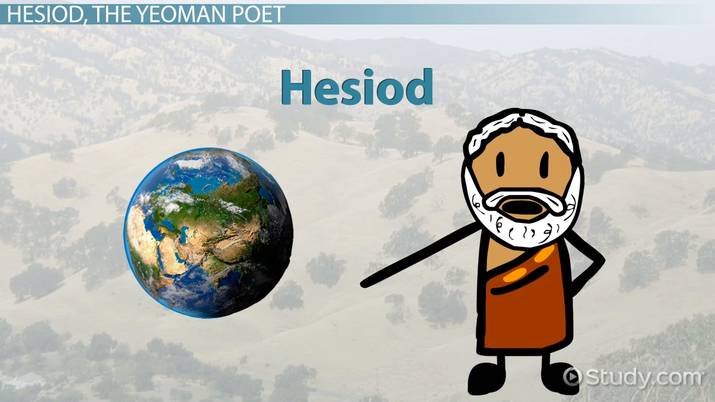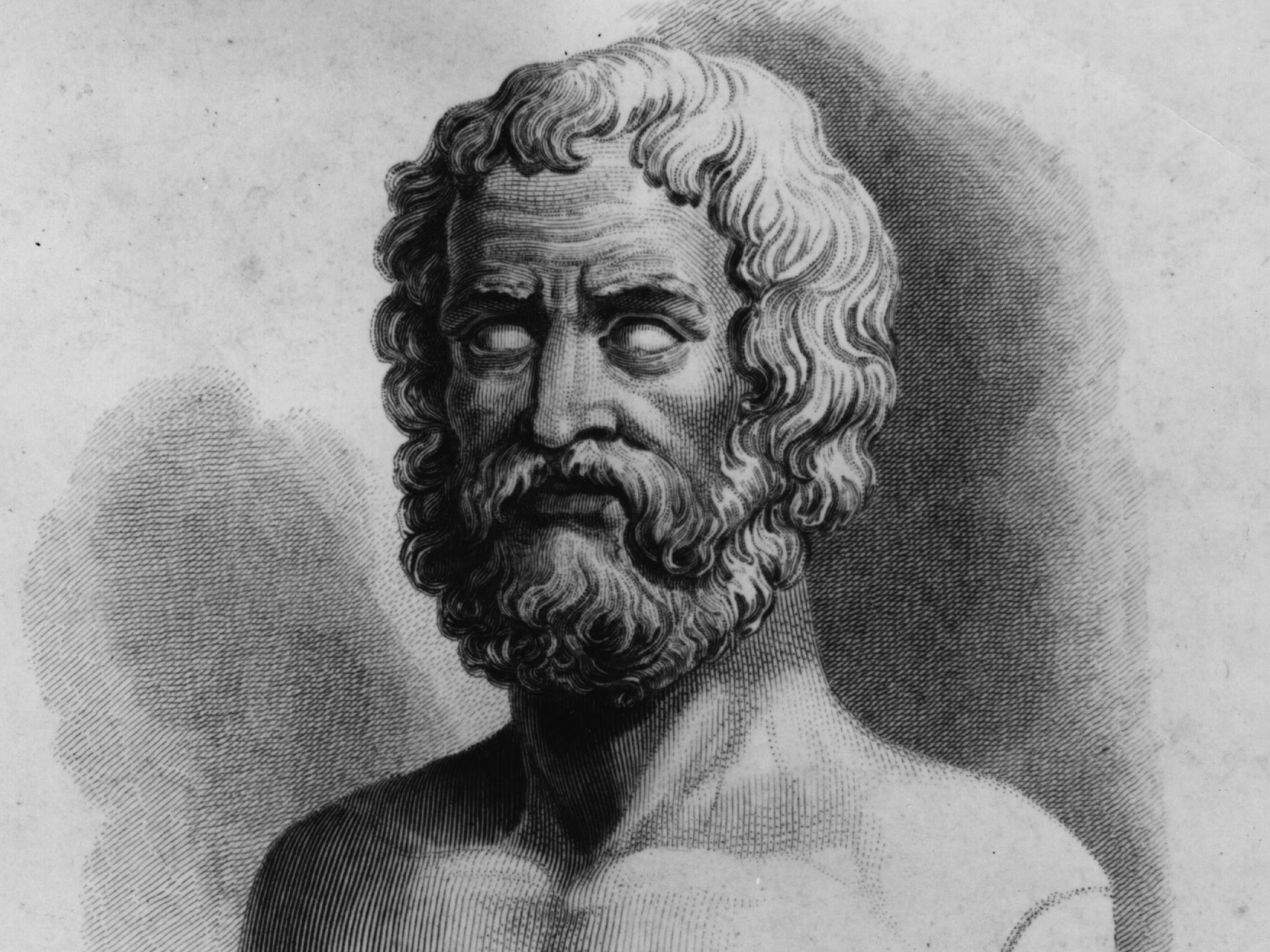Hesiod: The Poet of Ancient Wisdom and Myth
The ancient world gifted us many poets whose works have traversed centuries, inspiring countless generations. Among these luminaries stands Hesiod, one of the pivotal figures in early Greek literature. Though he might not bask in the same spotlight as Homer, whose epic tales have captivated audiences time and again, Hesiod's contributions remain an indelible part of the historical and cultural tapestry of ancient Greece.
Historical Context and Life
The life of Hesiod is shrouded in mystery and legend, similar to many figures of antiquity. Most of what we know about him comes from his own works and later Greek tradition. Born in the 8th century BCE, likely in the region of Boeotia, Hesiod's life was intertwined with the landscapes and rural communities of Greece. His works reflect a deep connection to the agrarian world, dominated by the rhythms of the seasons and the whims of the gods.
Unlike Homer, whose birthplace is the subject of several claims, Hesiod is associated primarily with Ascra, a village at the foot of Mount Helicon. This setting is crucial, not just for understanding the man but also the mythic and philosophical concerns that saturate his writings. Through his verses, Hesiod paints a picture of a life that was both ordinary in its daily struggles and extraordinary in its engagement with the divine.
Main Works: Embracing Myth and Morality
Hesiod’s work can be divided into two major poems: "Theogony" and "Works and Days." Each serves as a testament to Hesiod's role as not just a poet, but a chronicler of myths and moral teacher.
Theogony
"Theogony," translated as the "birth of the gods," is an epic poem that stands as one of the earliest comprehensive accounts of Greek mythology. This work offers a genealogy of the gods, chronicling their origins, relationships, and the cosmos they inhabit. It begins with the primordial entities like Chaos and Gaia and advances through the complex family trees of the Olympian gods. What makes the "Theogony" remarkable is its systematic approach to myth, a precursor to the mythographers that succeeded him.
In "Theogony," Hesiod lays the foundation for much of the classical mythology that would later inspire poets, dramatists, and artists. Through vivid descriptions and intricate storytelling, he weaves tales of power, betrayal, and destiny, offering a cosmic vision that seeks to explain not just the nature of the gods but the very universe itself.
Works and Days
In contrast to the celestial scope of "Theogony," "Works and Days" is grounded firmly in the human experience. It is a didactic poem that combines practical advice on agriculture and ethics with mythological storytelling. Addressed to Hesiod's brother Perses, the poem is a blend of practical instruction, moral exhortation, and mythological digressions.
"Works and Days" reflects Hesiod's intimate knowledge of everyday life in an agrarian society. The poem is structured around the theme of hard work as a divine mandate, presenting labor as both a necessity and a virtue. Hesiod delineates the struggles and rewards of farming, interspersing pragmatic guidance with narratives like the tale of Pandora and the myth of the Five Ages of Man. Through these stories, Hesiod articulates a worldview where human existence is entwined with the will of the gods and subject to the moral order they impose.
Philosophical and Cultural Impact
The philosophical undertones in Hesiod's work suggest a depth that transcends mere storytelling. Both "Theogony" and "Works and Days" reveal a world where divine causality shapes human fate, reflecting a belief system that was instrumental in forming ancient Greek thought.
Hesiod’s emphasis on morality and justice, especially in "Works and Days," offers insight into the ethical paradigms of his time. The distinction between right and wrong, the merits of a righteous life, and the consequences of hubris are recurring motifs that signal an early attempt to grappling with moral philosophy.
Culturally, Hesiod's works have been pivotal. His mythological narratives not only served as a cornerstone for later Greek literature but also influenced Roman and Western literary traditions. In Rome, writers like Ovid drew inspiration from Hesiod's theogonic models to craft their own epic poetry, extending Hesiod's reach far beyond the confines of ancient Greece.
As we delve into the realms that Hesiod so masterfully created, it becomes clear that his legacy is not just of ancient tales and practical advice, but of timeless reflections on the human condition and its place within a broader, divine tapestry. Hesiod remains a crucial figure in understanding the origins of Western literature, myth, and philosophy, offering a bridge between the world of the gods and the struggles inherent in human life.
The Influence of Hesiod on Greek Religion and Society
Hesiod's works, with their profound mythological and ethical insights, played a pivotal role in shaping Greek religious practices and social values. The poet not only chronicled the divine hierarchy but also provided a framework that ancient Greeks used to understand their place within the universe and society. Hesiod's portrayal of divine interactions and cosmic order was integral in outlining the relationship between mortals and the pantheon of gods, influencing both religious worship and social norms.
Shaping Religious Thought
"Theogony" provided a theological structure that was essential for ancient Greek religion. By systematically detailing the genealogy of the gods, Hesiod offered more than just tales; he defined a divine lineage that informed the cultic practices and religious rituals of ancient Greece. His depiction of the Olympian gods established a divine order that permeated religious ceremonies, temple worship, and societal festivals, ensuring that these practices were aligned with the narratives he set forth.
The importance of understanding the divine hierarchy in "Theogony" cannot be overstated. It formed the basis of Greek mythological consciousness, providing a template for the myths that were enacted during religious rites. The stories of gods and their exploits played out not just on parchment but in sacred spaces as well, from temples to domestic altars. These narratives evolved over time but often remained tethered to Hesiod’s original framework, highlighting his enduring impact on Greek spirituality.
Ethical and Social Ramifications
While "Theogony" mapped the heavens, "Works and Days" addressed mortal concerns, weaving a tapestry of ethical teachings that resonated deeply with its audience. This poem underscores the significance of justice (or "dike") and hard work, concepts that were crucial during Hesiod’s time and became ingrained in Greek civilization. Hesiod’s narrative encourages individuals to live justly and labor diligently, tying the prosperity of individuals and communities to moral conduct and effort.
Through the myth of Pandora, Hesiod explains the inception of human hardship and the presence of evil in the world. Pandora, crafted by the gods and given to humanity as a gift, unwittingly unleashes suffering, leaving hope as a solitary saving grace for mankind. This myth reflects Hesiod’s exploration of human nature and the duality of existence, emphasizing a pragmatic approach to life’s challenges. The allegorical resonance of this tale became a cultural touchstone, elucidating the unpredictable nature of fortune and the necessity of perseverance.
Moreover, the Ages of Man, presented in "Works and Days," offers a poignant narrative about the moral decline over successive human eras, starting with the Golden Age and culminating in the Age of Iron, where Hesiod places himself. This account serves a dual purpose: it mirrors societal concerns about moral erosion while reinforcing the necessity of striving toward righteousness and order amidst chaos.
Hesiod's Legacy in Literature
Hesiod’s contributions are not confined to his lifetime; they continue to echo through the literature of subsequent generations. His exploration of themes—creation, morality, and labor—have provided a rich vein for writers across the ages to mine, ensuring that his influence extends well beyond his original audience.
Classical and Post-Classical Influence
Later Greek poets and philosophers frequently engaged with Hesiod’s works, either by building upon his mythological groundwork or critiquing his interpretations. Philosophers like Plato and Aristotle referenced Hesiod in discussions about ethics and cosmology, acknowledging his significant contributions to the discourse on the human condition.
In Rome, Hesiod’s influence is evident in the works of poets such as Ovid and Virgil. Ovid’s "Metamorphoses" shares thematic elements with Hesiod, particularly in its exploration of divine genealogy and moralizing tales, demonstrating the continuation of Hesiod’s narrative style across cultures. Virgil's "Georgics," meanwhile, echoes the practical and moral undertones of "Works and Days," illustrating the continuing relevance of Hesiod’s agricultural wisdom.
Modern Resonance
Hesiod’s insights remain relevant in modern contexts, frequently studied for their philosophical and ethical dimensions. In the conversation surrounding environmental ethics, for example, scholars have revisited "Works and Days" to explore early articulations of human stewardship of nature. Hesiod’s foresight into the interdependence between humanity and the earth resonates in contemporary dialogues about sustainability and ecological responsibility.
Furthermore, the moral lessons embedded within Hesiod’s poetry continue to interest scholars and ethicists alike. His reflections on justice and the human capacity for both greatness and folly offer timeless reminders of the ethical choices individuals and societies face.
In essence, Hesiod’s legacy is one of both historical and continuous influence. Through his poetic endeavors, he offers a lens to examine not only the intricate relationships between the divine and mortal but also the ethical frameworks that guide human action. Hesiod's works stand as pillars within the vast edifice of Western literary and philosophical traditions, continuing to illuminate the human condition with the same vigor as they did in ancient times.
Controversies and Criticisms Surrounding Hesiod's Works
While Hesiod's contributions to literature and society are undeniable, his works have not been without their controversies and criticisms. Scholars and philosophers over the centuries have debated the validity and accuracy of his mythological accounts, his portrayal of women, and the overall worldview that emerges from his poetry.
Mythological Discrepancies
One of the primary critiques of Hesiod's work stems from inconsistencies found within his mythological narratives. "Theogony," while comprehensive in its account of divine ancestry, sometimes contradicts other ancient sources or presents variations that differ from later, more established myths. For instance, differing accounts of how certain gods came to power or the specifics of divine conflicts are present when Hesiod’s work is compared to other mythological texts such as Homer’s epics.
These discrepancies have fueled scholarly debate regarding Hesiod's sources and his influence on standardizing Greek mythology. Some suggest that Hesiod’s narratives reflect localized variants or personal interpretations rather than an objective catalog of Greek mythology. This notion raises important questions about the nature of myth-making and its fluidity, highlighting the tension between oral traditions and written records that characterized ancient storytelling.
Portrayal of Women
Hesiod’s depiction of women, particularly in "Works and Days," has also drawn criticism, especially from modern scholars examining gender roles in ancient literature. The most notable example is the story of Pandora, the first woman, who is portrayed as a bringer of evils to humanity. Hesiod describes Pandora as a "beautiful evil," crafted deceitfully by the gods to punish mankind. This narrative has been critiqued for perpetuating misogynistic ideas that associate women with treachery and suffering.
Hesiod’s portrayal reflects broader ancient Greek attitudes toward women, encapsulating societal norms that considered women as subordinate and often disruptive. While it offers valuable insights into historical gender dynamics, his work also serves as a point of contention in discussions about patriarchal ideologies present in ancient texts.
Pessimistic Worldview
Another topic of scholarly interest is the seemingly pessimistic worldview that permeates Hesiod’s writings. Both "Theogony" and "Works and Days" convey a vision of existence fraught with struggle and divine retribution. The theme of decline—from a golden age to the current age of iron, where humans toil endlessly—suggests a world heavy with hardship.
Critics argue that Hesiod’s works may present an overly fatalistic perspective, where human agency is limited, and existence is dictated largely by the whims of the divine. Yet this interpretation also offers insights into the challenges faced by people in Hesiod’s time, reflecting societal anxieties about hardship, justice, and mortality. Furthermore, the moral undertones in Hesiod's work do offer paths toward understanding and mitigating these challenges through ethical living and hard work.
The Enduring Significance of Hesiod
Despite these critiques, Hesiod's works have persisted through the centuries because of their depth, complexity, and ability to address universal themes. They invite readers into a world where humans must navigate the intricate tapestry woven by the gods, natural forces, and their moral choices.
Educational and Cultural Value
As an educational tool, Hesiod's poetry has been instrumental in teaching Greek language, mythology, and ethics. For centuries, "Theogony" and "Works and Days" have provided a framework for educating students not just in literature, but in understanding cultural ethos, historical context, and humanistic values.
Additionally, the cultural legacy of Hesiod can be observed in the arts. His themes and stories have inspired countless works of visual art, drama, and music, each iteration offering new interpretations and insights. From classical sculptures depicting mythological scenes to operatic adaptations, Hesiod’s narratives continue to fuel creative expression.
Modern Relevance and Reflection
In contemporary times, revisiting Hesiod offers opportunities to reflect on ongoing societal challenges. As discussions about justice, environmental stewardship, and ethical responsibility gain prominence, revisiting ancient texts like Hesiod’s can provide valuable perspectives. His emphasis on morality, the consequences of human actions, and the inevitable challenges of life continue to resonate with modern audiences seeking to understand their own place in a complex world.
Hesiod’s works remind us that while times have changed, certain aspects of the human condition remain constant. His poetry encourages continual reflection on our relationship with the natural world, the importance of labor, and the ethical dimensions of our interactions with others.
In conclusion, Hesiod stands not as a mere poet of ancient Greek society but as a timeless philosopher with insights that reverberate into modernity. His enduring legacy offers a rich tapestry of mythological and moral principles that continue to challenge and inspire readers across cultures and epochs. By exploring both the cosmic and mundane elements of existence, Hesiod’s works invite us to ponder the eternal questions of existence, morality, and the divine order that connects us all.


:max_bytes(150000):strip_icc()/bust-of-hesiod--stone--57298040-5ba7fb454cedfd00504d3e96.jpg)





Comments